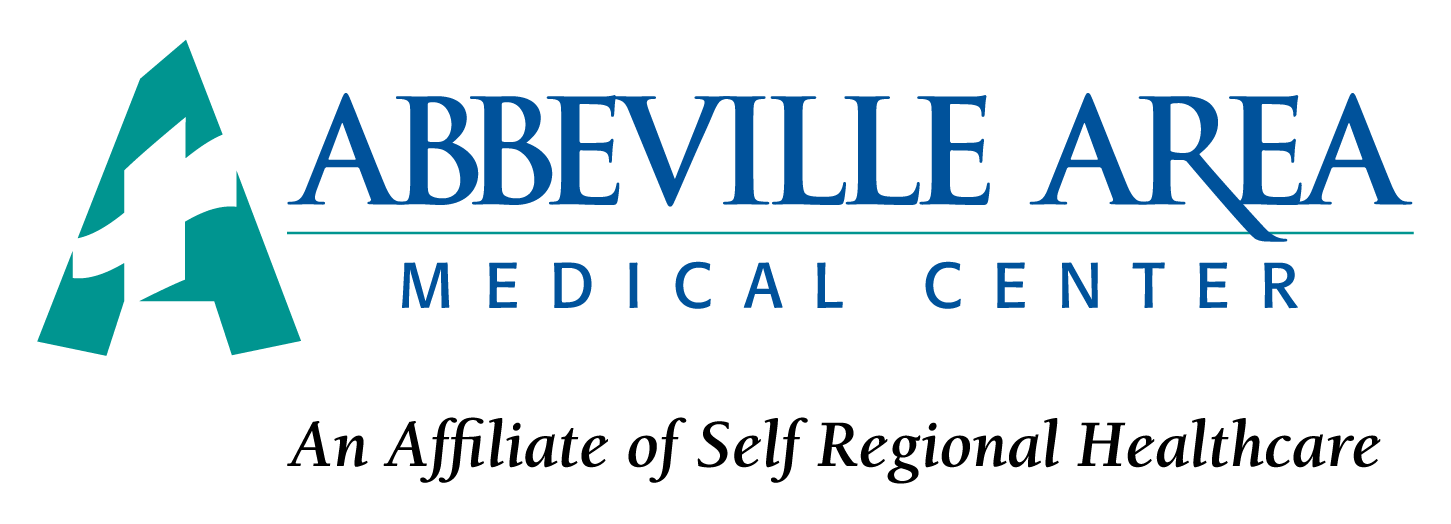We want to encourage you, as a patient of Abbeville Area Medical Center or one of its Physician Network practices, to speak openly with your health care team, take part in your treatment choices, and promote your own safety by being well-informed and involved in your care. Because we want you to think of yourself as a partner in your care, we want you to know your rights as well as your responsibilities during your outpatient treatment at Abbeville Area Medical Center or its Physician Network practices. We invite you and your family to join us as active members of your health care team.
You have the right to:
Participate in decisions about your care, your treatment and services provided, including the right to refuse treatment to the extent permitted by law. You may include family and friends, with your permission, in these decisions. If you leave the hospital against the advice of your doctor, the hospital and doctors will not be responsible for any medical consequences that may occur.
Have a family member or person of your choice and your own doctor be notified promptly of your admission to the hospital.
Expect full consideration of your privacy and confidentiality in care discussions, exams and treatments. You may ask for an escort during any type of exam.
Receive care in a safe environment free from all forms of abuse, neglect or mistreatment.
Expect that all communications and records about your care are confidential, unless disclosure is permitted by law. You have the right to see or get a copy of your medical record. You may add information to your medical record by contacting the Medical Records Department. You have the right to request a list of people to whom your personal health information was disclosed.
Protection of your Privacy. We respect the confidentiality of your relationship with your doctor and caregivers, and the sensitive information about your health and health care that are part of that relationship. State and federal laws and hospital operating policies protect the privacy of your medical information. You will receive a Notice of Privacy Practices that describes the ways that we use, disclose and safeguard patient information. If you have any questions or would like a copy of AAMC’s HIPAA Privacy Notice, please contact the Privacy Officer at 864-366-3313.
Make an advance directive and appoint someone to make health care decisions for you if you are unable to do so. If you have signed a health care power of attorney stating who should speak for you if you become unable to make health care decisions for yourself, or a “living will” or “advance directive” that states your wishes about end-of-life care, give copies to your doctor, your family and your care team. If you or your family need help making difficult decisions, counselors, chaplains and others are available to help. If you do not have an advance directive, we can provide you with the information and help you complete one.
Communication you can understand. The hospital and its physician clinics will provide sign language and foreign language interpreters as needed at no cost. Information given will be appropriate to your age, understanding and language. If you have vision, speech, hearing and/or other impairments, you will receive additional aids to ensure that your care needs are met. To request these services, please speak with your caregiver.
Give or refuse consent for recordings, photographs, films or other images to be produced or used for internal or external purposes other than identification, diagnosis or treatment. You have the right to withdraw consent up until a reasonable time before the item is used.
Involvement in your care. You and your doctor often make decisions about your care before you go to the hospital. Other times, especially in emergencies, those decisions are made during your hospital stay. When decision-making takes place, it should include:
Discussing your medical condition and information about medically appropriate treatment choices. To make informed decisions with your doctor, you need to understand:
- The benefits and risks of each treatment.
- Whether your treatment is experimental or part of a research study.
- What you can reasonably expect from your treatment and any long-term effects it might have on your quality of life.
- What you and your family will need to do after you leave the hospital.
- The financial consequences of using uncovered services or out-of-network providers.
Please tell your caregivers if you need more information about treatment choices.
Getting information from you. Your caregivers need complete and correct information about your health, medications and coverage so that they can make good decisions about your care. That includes:
- Past illnesses, surgeries or hospital stays.
- Past allergic reactions.
- Any medicines or dietary supplements (such as vitamins and herbs) that you are taking.
- Any network or admission requirements under your health plan.
- Be free of restraints and seclusion in any form that is not medically required.
Understand our visiting hours. Your care partner or family member is welcome 24 hours a day. Others are welcome from 8:00am to 8:00pm if they don’t have a cough, fever or sore throat. But if you’re not up to company, let your health care partner or nurse known. Visiting hours for the ED may be different depending on the patient’s health status.
If you are classified as an Inpatient, Inpatient Tele, Outpatient observation, outpatient Observation Tele, Inpatient ICU, or Outpatient Surgery (overnight stay) you will be given a Patient and Family Handbook that will include your “Rights and Responsibilities” as well as additional helpful information.
Voice your concerns about your care and experience. At Abbeville Area Medical Center and our Physician Network practices, we are continuously working to improve our service to patients. An important part of this service is the way you feel you are treated by our staff members, volunteers and physicians. It is important that we hear about any concerns while you are in the hospital, physician clinics, or under care by our home health agency, Health Related Home Care. Please do not feel uncomfortable raising these concerns. We are committed to making sure that you receive compassionate, quality care. If there is anything we can do to improve the services we are providing, please talk with our staff.
For many concerns, it’s usually best to first speak with the people caring for you. This would probably be your nurse, hospital case manager, or office staff. If you don’t feel that they are helping you, please ask to speak to the supervisor, manager or director. If you still are unsatisfied with the resolve to your concern, you may file a grievance with the hospital. The hospital will review, investigate and resolve the grievance in a reasonable amount of time-generally 10 days from the time it is received. The hospital will respond to you in writing, in an easy to understand manner. The letter should tell you the steps that have been taken on your behalf to investigate the grievance, the results, and a contact person. You, or the hospital personnel, may also want to meet in person to talk about what happened.
AAMC contact person for grievances:
Mary Margaret Jackson, 864-366-3279
PO Box 887
Abbeville, SC 29620
A grievance is considered closed when you are satisfied with the actions taken by the hospital. There may be times, however, when the hospital feels it has taken reasonable steps to address your concern, but you are still unsatisfied. That’s when you may consider filing your concern with a hospital oversight organization-the next step below.
The South Carolina Department of Health and Environmental Control (DHEC) licenses and certifies South Carolina hospitals. This means that the hospitals must meet certain rules and regulations to care for patients and receive payment. One function of DHEC is to investigate complaints about any facility they license.
Submitting a Complaint
You can file a complaint with SCHEC, DNV or the Office for Civil Rights:
SCDHEC Bureau of Certification
1-800-922-6735 (voicemail available)
Fax: 803-545-4292 Email: rushrf@dhec.sc.gov
Mail: SCDHEC Bureau of Certification/Health Regulation
2600 Bull Street Columbia, SC 29201
DNV
1-866-9647
Mail: DNV 400 Techne Center Drive, Suite 100
Milford, OH 45150
website: www.dnvglhealthcare.com
E-mail: hospitalcomplaint@dnvgl.com
Office for Civil Rights
You may file a complaint online using this online form. You may print and mail the form to:
Centralized Case Management Operations
US Department of Health and Human Services
200 Independence Avenue SW, Room 509F, HHH Bldg. Washington DC 20201
or email the completed complaint and consent forms to:
OCRComplaint@hhs.gov
Phone: 410-786-5510 Fax: 410-786-9549
Medicare: If Medicare (federal health insurance program for people over age 65 or people under 65 who are disabled) pays for you or your loved one’s care, you may have an additional place to go with a quality of care concern. Medicare pays a Quality Improvement Organization (QIO) in each state to oversee the quality of care provided to Medicare patients. In South Carolina, that organization is called the Carolinas Center for Medical Excellence (CCME). You can call CCME at the following number: 1-844-455-8708. Explain to the person who answers the phone what your concerns are. Depending on the type of problem you are having, they may be able to help right away. For example, with your permission, they may be able to call the hospital to see if they can help solve your problem. In other cases, they may ask you to send your complaint in writing using a complaint form.
Statement of Nondiscrimination
Abbeville Area Medical Center complies with applicable Federal civil rights laws and does not discriminate based upon the individual’s ability to pay; whether payment for services would be made under Medicare, Medicaid or CHIP; and does not discriminate against the individual’s race, color, sex, national origin, disability, religion, age, sexual orientation or gender identity.
Spanish: ATENCIÓN: si habla español, tiene a su disposición servicios gratuitos de asistencia lingüística. Llame al 1-864-366-5011 (TTY: 1-800-735-8583).
Chinese: 注意:如果您使用繁體中文,您可以免費獲得語言援助服務。請致電 1-864-366-5011 (TTY: 1-800-735-8583)。
SC Hospital Infections Disclosure Act
Abbeville Area Medical Center participates in the SC Hospital Infections Disclosure Act. Our infection rates are made available to the public on the DHEC website at www.scdhec.gov or contact our Infection Control Nurse at 366-3374 for information.
Hearing & Visually Impaired
Translation and interpretation services are available as well as assistance for hearing and visually impaired individuals. To request these services, please speak with your nurse.
Patient Responsibilities
You have the responsibility to:
- Provide complete and accurate information, including your full name, address, telephone number, date of birth, Social Security number, insurance carrier and employer, when it is required.
- Provide the hospital or your doctor with a copy of your advance directive if you have one.
- Provide complete and accurate information about your health and medical history, including present condition, past illness, hospital stays, medicines, vitamins, herbal products and any other matters pertaining to your health, including perceived safety risks.
- Ask questions when you do not understand information or instructions. If you believe you cannot follow through with your treatment plan, you are responsible for telling your doctor. You are responsible for outcomes if you do not follow your care, treatment and service plans.
You have the responsibility to:
- Actively participate in your pain management plan, keeping your doctors and nurses informed of the effectiveness of your treatment.
- Leave valuables at home and bring only necessary items for your hospital stay.
- Treat all hospital staff members, other patients and visitors with courtesy and respect; abide by all hospital rules and safety regulations; and be mindful of noise levels, privacy and number of visitors.
- Provide complete and accurate information about your health insurance coverage and pay your bills in a timely manner.
- Be responsible for keeping appointments, being on time and calling your health provider if you cannot keep your appointment.

